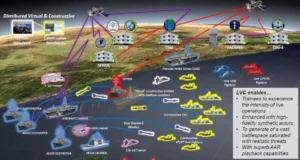ManTech [MANT] on Tuesday said it won a $337 million contract to provide services to help test systems for the Navy’s Live, Virtual, Constructive (LVC) training capability.
This four-year award is part of a Department of Defense Innovation Analysis Center’s (IAC) multiple-award contract (MAC) vehicle in support of the Naval Surface Warfare Center Corona’s Navy Continuous Training Environment (NCTE). The NCTE is an interconnected network of simulation, training, and command, control, communications, computers and intelligence (C4I) systems that make up a virtual range for Navy platform and weapon systems to experiment and train on.
Specifically, under this contract, ManTech said it will provide engineering and technical services that integrate and test advanced systems for the Navy’s LVC training capability.
A company spokesperson told Defense Daily the contract was awarded on Oct. 10 after the Government Accountability Office (GAO) denied a protest of the contract by Alion Science and Technology Corp. on Aug. 31. ManTech and Alion were two of three respondents to the solicitation under the MAC.
Alion filed a protest of the initial task order on May 24.
The spokesperson added that after the protest concluded the customer set the start date for May 11, as originally intended. Since the protest was decided by August, the customer compensated for time lost by extending the contract by 104 days, making the official start date May 11, 2022 and official end date now Aug. 22, 2026.
The company underscored it has been a feature of the Navy and Marine Corps’ virtual training capabilities for over 15 years, early on introducing the industry’s first cyber range for DoD and helping the Navy train on digital twins of their networks and infrastructure.
“The Navy’s Continuous Training Environment program will be a driving force of the U.S. Department of Defense’s joint warfare strategy, advancing the goal of seamless collaboration between Navy, Joint and coalition partner forces in any scenario,” David Hathaway, executive vice president and general manager of ManTech’s Defense Sector, said in a statement,
“With ManTech’s broad experience on-board, NCTE’s Live, Virtual and Constructive training will support the broadest conceivable array of use cases – from ballistic missile defense to electronic warfare and air combat – extending our nation’s maritime dominance,” he continued.
The company said this new LVC capability it is helping is operating under the authority of a Navy training initiative called “Weapons Systems and Aviation Warfare Modeling & Simulation, Engineering, Integration, Experimentation and Cybersecurity for Leading Edge Training.”
ManTech argued NCTE has become a “powerful tool for assessing weapon systems, developing concepts for weapon systems employment, validating such concepts on a distributed basis, and for combat system training using embedded and standalone training systems within the framework of Fleet Synthetic Training (FST) and LVC training.”
The NCTE program seeks to also develop weapon systems representations based on current and future weapons systems, test and validate those virtual concepts, and ultimately incorporate them into the Navy’s doctrine, FST and LVC training capabilities.

Critical to this mission is the ability to develop real-world weapons systems representations based upon existing and future maritime and joint weapon systems to test and validate these concepts and to incorporate them in the Navy’s core doctrine and its FST and LVC training capabilities.
Earlier this year, ManTech announced it won a $118 million task order to continue supporting the Naval Surface Warfare Center’s intelligence, surveillance and reconnaissance (ISR) capabilities via model-based system engineering and electro-optical sensors for situational awareness (Defense Daily, Feb. 1).
Previously, in 2020, ManTech won a four-year $260 million task order to implement a technology modernization initiative to help transform mission systems in the manned Navy maritime patrol and reconnaissance air force under the DoD IAC MAC vehicle (Defense Daily, Oct. 23, 2020).
